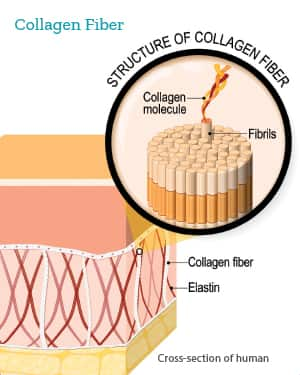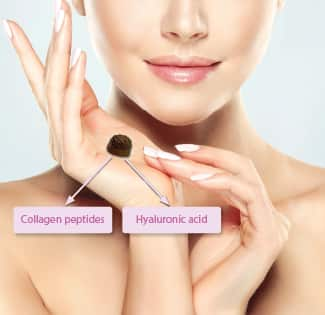Life Extension Magazine®
As we age, our skin loses two natural compounds that keep it smooth, moisturized, and youthful looking:
- Collagen and
- Hyaluronic acid.1,2
The loss of these skin components leads to wrinkles, sagging, and dryness.1,2
But there’s a way to prevent and even reverse these changes. Scientists have clinically demonstrated that:
- Oral use of a collagen peptide improves skin elasticity by an average of 7%3 and reduces the volume of eye wrinkles by 20%.4
- Oral use of hyaluronic acid significantly increases skin moisture in those with chronically dry, rough skin after just 3-6 weeks.1
Researchers have now devised a way to deliver clinically effective doses of these two nutrients together in a tasty, fruit-flavored gummy. Working from the inside out, they can rejuvenate the skin and return it to optimal health.
Collagen Keeps Skin Youthful
The word collagen comes from the Greek kola, “glue.” Essentially, collagen—the most abundant protein in the human body—is the glue that holds the entire body together.
It’s the main component of most connective tissues, like tendons and muscle, and makes up 70% of the inner layer of skin by weight.5,6
Collagen provides strength and resilience and is integrated with elastin fibers, the protein that gives skin flexibility and elasticity. Elastin allows the skin to return to its original shape after it’s been stretched.7
But collagen production begins to decline around age 25. The cells that produce collagen fibers slow down, and the remaining fibers can stiffen, break, and lose proper shape over time. Elastin fibers also begin to fray and lose elasticity.
It is no coincidence that visible skin aging occurs in many people around age 25, which is when collagen production begins to drop.
Adults lose about 1% of their skin collagen each year.8 While this may not seem like a lot, after several decades, we may have lost half the skin collagen we had at age 18.8,9
This decline accelerates faster in women after menopause. Factors such as smoking, high blood sugar, and sun exposure also decrease collagen levels.10-14
Reduced collagen production has a devastating effect on the skin, resulting in thinning, sagging, and wrinkles.8,9
To solve this problem, scientists developed collagen peptides that provide the building blocks for collagen.
Taken orally, they stimulate the production of new collagen and elastin in the skin. This leads to increased suppleness and elasticity and reduces wrinkles.4
Oral Collagen Research

In animal studies, scientists showed that hydrolyzed (or partially broken-down) collagen peptides boosted the creation and activity of collagen.15 This produces stronger, more supple skin.
Collagen peptides also decreased the activity of a “protein-melting” enzyme (matrix metalloproteinase 2) that degrades collagen and hastens skin aging.15
Human trials have now demonstrated that an oral collagen peptide is clinically effective in improving skin appearance.3,4
Scientists evaluated the effectiveness of collagen peptides on skin elasticity. One group of volunteers received 2.5 grams of oral collagen daily, one received 5 grams daily, and a third received a placebo.3
After eight weeks, both groups taking the oral collagen had an average 7% improvement in skin elasticity. Remarkably, those subjects retained higher elasticity than the placebo group even four weeks after the last dose. The improvement in skin elasticity was found to be greater in women over age 49.3
Next, researchers tested collagen on skin wrinkles. In a double-blind, placebo-controlled trial, they gave oral collagen peptides to 114 women, aged 45 to 65, in daily doses of 2.5 grams.4
Results from Human Study
After four weeks, the volume of eye wrinkles for the collagen group had decreased by 7.2%, compared with placebo recipients. After the full eight-week trial, those taking oral collagen peptides showed a stunning 20.1% reduction in the size of eye wrinkles.4
In the same trial, scientists studied how collagen peptides affected the synthesis of the dermal matrix, the structural framework responsible for skin renewal and vitality. They did so by measuring structural proteins in the matrix. The more proteins, the healthier and more youthful the skin appears.4
The study found that subjects taking collagen had a 65% increase in essential type-I pro-collagen and an 18% increase in elastin fibers.4
Hyaluronic Acid Moisturizes Skin
Hyaluronic acid is equally critical for maintaining and restoring youthful-looking skin.
It’s a carbohydrate present in most body tissues. More than 50% of it is found in the skin, where it helps hold in moisture.1,16 In fact, hyaluronic acid can hold up to 1,000 times its weight in water.17
Hyaluronic acid is an essential part of the extracellular matrix, a network that provides structural integrity and cohesion to skin.18 It supports skin hydration,19 stimulates synthesis of collagen and elastin,20-22 promotes tissue repair,23-26 and combats the effects of ultraviolet radiation.26
In other words, the skin needs hyaluronic acid to maintain a healthy and youthful appearance.
But the body produces less of it as we age. This problem is worsened by environmental stress, particularly chronic sun exposure.27-30 The result is wrinkling, dryness, and sagging.
In a dramatic finding, however, scientists have demonstrated that oral hyaluronic acid can slow—and even reverse—these effects.
Oral Hyaluronic Acid Rehydrates Skin
Scientists conducted an in-depth analysis of several previous studies of hyaluronic acid. In most, volunteers had been diagnosed with “chronically rough and dry skin,” which was not substantially improved by moisturizers or other treatments.1
But hyaluronic acid made a radical difference. Compared to volunteers who received a placebo, those taking oral hyaluronic acid had a significant increase in skin moisture after just three to six weeks. And the moisturizing effects continued for a full two weeks after they stopped taking it.1
Hyaluronic acid also reduced itching that comes with dry skin.1

WHAT YOU NEED TO KNOW
Get Healthier, Younger-Looking Skin
- Collagen and hyaluronic acid are two nutrients vital to the health and youthful appearance of our skin. The body produces less of them as we age, causing wrinkling, sagging, and dryness.
- Taking oral collagen peptides spurs the synthesis of new collagen, improving skin elasticity, boosting essential structural proteins, and reducing the size of eye wrinkles by as much as 20%.
- Hyaluronic acid taken orally has been shown to reverse the loss of moisture in aging skin, effectively treating dry, itchy skin and helping to restore a more youthful appearance.
- Taking these two nutrients together at clinically effective doses can lead to healthier, smoother, and younger-looking skin.
In fact, the scientists concluded that skin dryness is caused by a decrease in hyaluronic acid due to aging, sun exposure, smoking, and other factors. Their study found that hyaluronic acid safely and effectively moisturizes the skin and improves its health.1
You can now orally replenish the skin’s diminishing supplies of both collagen and hyaluronic acid. These two nutrients have been shown to:
- Increase skin moisture,
- Improve elasticity,
- Decrease wrinkle depth,
- Boost levels of the skin’s structural proteins, and
- Provide more youthful-looking skin.
Summary

Collagen and hyaluronic acid keep our skin smooth, supple, moisturized and youthful looking. But, as we age, we lose both these nutrients.
Taking oral collagen peptides boosts the synthesis of new collagen in the skin. That improves skin structure and elasticity, reduces eye wrinkle depth up to 20%, and increases levels of proteins that provide strength and resilience to the dermal matrix.
Oral hyaluronic acid also protects and nourishes skin by boosting moisture content. That can help treat dry, itchy skin, and make it healthier and younger looking.
Both of these nutrients can now be taken together in clinically effective doses, quickly providing noticeable improvements in the appearance of aging skin.
If you have any questions on the scientific content of this article, please call a Life Extension® Wellness Specialist at 1-866-864-3027.

References
- Kawada C, Yoshida T, Yoshida H, et al. Ingested hyaluronan moisturizes dry skin. Nutr J. 2014 Jul 11;13:70.
- Rittie L, Fisher GJ. Natural and sun-induced aging of human skin. Cold Spring Harb Perspect Med. 2015 Jan 5;5(1):a015370.
- Proksch E, Segger D, Degwert J, et al. Oral supplementation of specific collagen peptides has beneficial effects on human skin physiology: a double-blind, placebo-controlled study. Skin Pharmacol Physiol. 2014;27(1):47-55.
- Proksch E, Schunck M, Zague V, et al. Oral intake of specific bioactive collagen peptides reduces skin wrinkles and increases dermal matrix synthesis. Skin Pharmacol Physiol. 2014;27(3):113-9.
- Available at: https://www.ncbi.nlm.nih.gov/books/NBK507709/. Accessed January 20, 2020.
- Available at: https://emedicine.medscape.com/article/1294744-overview#showall. Accessed January 20, 2020.
- Available at: https://www.ncbi.nlm.nih.gov/books/NBK21582/. Accessed January 24, 2020.
- Ganceviciene R, Liakou AI, Theodoridis A, et al. Skin anti-aging strategies. Dermatoendocrinol. 2012 Jul 1;4(3):308-19.
- Available at: https://www.scientificamerican.com/article/why-does-skin-wrinkle-wit/. Accessed January 18, 2019.
- Gautieri A, Passini FS, Silvan U, et al. Advanced glycation end-products: Mechanics of aged collagen from molecule to tissue. Matrix Biol. 2017 May;59:95-108.
- Uitto J. The role of elastin and collagen in cutaneous aging: intrinsic aging versus photoexposure. J Drugs Dermatol. 2008 Feb;7(2 Suppl):s12-6.
- Danby FW. Nutrition and aging skin: sugar and glycation. Clin Dermatol. 2010 Jul-Aug;28(4):409-11.
- Knuutinen A, Kokkonen N, Risteli J, et al. Smoking affects collagen synthesis and extracellular matrix turnover in human skin. Br J Dermatol. 2002 Apr;146(4):588-94.
- Bosch R, Philips N, Suarez-Perez JA, et al. Mechanisms of Photoaging and Cutaneous Photocarcinogenesis, and Photoprotective Strategies with Phytochemicals. Antioxidants (Basel). 2015 Mar 26;4(2):248-68.
- Zague V, de Freitas V, da Costa Rosa M, et al. Collagen hydrolysate intake increases skin collagen expression and suppresses matrix metalloproteinase 2 activity. J Med Food. 2011 Jun;14(6):618-24.
- Laurent UB, Dahl LB, Reed RK. Catabolism of hyaluronan in rabbit skin takes place locally, in lymph nodes and liver. Exp Physiol. 1991 Sep;76(5):695-703.
- Mateo Orobia AJ, Saa J, Ollero Lorenzo A, et al. Combination of hyaluronic acid, carmellose, and osmoprotectants for the treatment of dry eye disease. Clin Ophthalmol. 2018;12:453-61.
- Nusgens BV. [Hyaluronic acid and extracellular matrix: a primitive molecule?]. Ann Dermatol Venereol. 2010 Apr;137 Suppl 1:S3-8.
- Masson F. [Skin hydration and hyaluronic acid]. Ann Dermatol Venereol. 2010 Apr;137 Suppl 1:S23-5.
- Beasley KL, Weiss MA, Weiss RA. Hyaluronic acid fillers: a comprehensive review. Facial Plast Surg. 2009 May;25(2):86-94.
- McKee CM, Penno MB, Cowman M, et al. Hyaluronan (HA) fragments induce chemokine gene expression in alveolar macrophages. The role of HA size and CD44. J Clin Invest. 1996 Nov 15;98(10):2403-13.
- Bukhari SNA, Roswandi NL, Waqas M, et al. Hyaluronic acid, a promising skin rejuvenating biomedicine: A review of recent updates and pre-clinical and clinical investigations on cosmetic and nutricosmetic effects. Int J Biol Macromol. 2018 Dec;120(Pt B):1682-95.
- Jiang D, Liang J, Noble PW. Hyaluronan in tissue injury and repair. Annu Rev Cell Dev Biol. 2007;23:435-61.
- Noble PW. Hyaluronan and its catabolic products in tissue injury and repair. Matrix Biol. 2002 Jan;21(1):25-9.
- Teriete P, Banerji S, Noble M, et al. Structure of the regulatory hyaluronan binding domain in the inflammatory leukocyte homing receptor CD44. Mol Cell. 2004 Feb 27;13(4):483-96.
- Wang Y, Lauer ME, Anand S, et al. Hyaluronan synthase 2 protects skin fibroblasts against apoptosis induced by environmental stress. J Biol Chem. 2014 Nov 14;289(46):32253-65.
- Dai G, Freudenberger T, Zipper P, et al. Chronic ultraviolet B irradiation causes loss of hyaluronic acid from mouse dermis because of down-regulation of hyaluronic acid synthases. Am J Pathol. 2007 Nov;171(5):1451-61.
- Ghersetich I, Lotti T, Campanile G, et al. Hyaluronic acid in cutaneous intrinsic aging. Int J Dermatol. 1994 Feb;33(2):119-22.
- Matuoka K, Hasegawa N, Namba M, et al. A decrease in hyaluronic acid synthesis by aging human fibroblasts leading to heparan sulfate enrichment and growth reduction. Aging (Milano). 1989 Sep;1(1):47-54.
- Rock K, Grandoch M, Majora M, et al. Collagen fragments inhibit hyaluronan synthesis in skin fibroblasts in response to ultraviolet B (UVB): new insights into mechanisms of matrix remodeling. J Biol Chem. 2011 May 20;286(20):18268-76.

